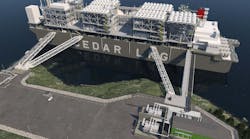Maureen Lorenzetti
The World Bank Group's (WBG) extractive industries section June 18 said it plans to dramatically change its lending practices for developing nations looking to expand oil, natural gas, and mineral production.
Officials rejected calls by some environmentalists, human rights groups, and an independent WBG auditor to stop funding oil projects. But WBG did pledge to focus more on gas projects in the future. The public can comment on the draft report for 30 days before the WBG board moves to formalize its plan.
Oil and gas
WBG's Rashad Kaldany, director of the oil, gas, mining, and chemicals department, said the bank plans to be more selective with projects by looking much more carefully at governance issues. This means engaging with local communities at an earlier stage than in the past to ensure there is broad support (OGJ, Feb. 16, 2004, p. 29). But officials are not closing the door on oil.
"We feel that our involvement can improve project outcomes, in particular with respect to country governance issues, but also with respect to getting benefits to local communities," Kaldany said. "We also feel that climate change issues are important, but our view is that this can best be addressed in other ways, in particular by focusing on improving energy efficiency and pushing as much as possible on the renewable energies, as we have indicated we will do."
Outside of the oil question, WBG generally endorsed an auditor's December 2003 recommendations, including using explicit good governance indicators in assessing and designing projects. Furthermore, it wants to reduce the risk that extractive industry revenues will be misused by requiring disclosure of revenue figures and key contracts terms for all large WBG funded projects.
Environmental concerns
The bank said it wants to see an average growth of at least 20%/year in both its energy efficiency and renewable-energy portfolio commitments over the next 5 years. It also will design projects that ensure that local communities and poorer segments of the population benefit. Environmentalists criticized the WBG plan, calling it unenforceable. And some green groups charged the bank is ignoring how cost-effective renewable energy projects can be.
One year's worth of World Bank spending on fossil fuel projects, if redirected to small-scale solar installations in sub-saharan Africa, could provide 10 million people on the continent with electric power, according to the London-based New Economics Foundation.
WBG officials disagreed with those assessments. They countered that their reforms are not just cosmetic, calling them "comprehensive, actionable, and monitorable." One way officials plan to make good on their promise to encourage more renewable energy and efficiency projects is to add staff and budget resources to its country and sector teams.
WBG also said it plans to organize "a steering group" to help the bank promote renewable fuels. Possible topics could be policy reform, research, and financing. Participants might include oil companies, academics, government officials, environmentalists, and human rights groups.
Author contact: [email protected]

